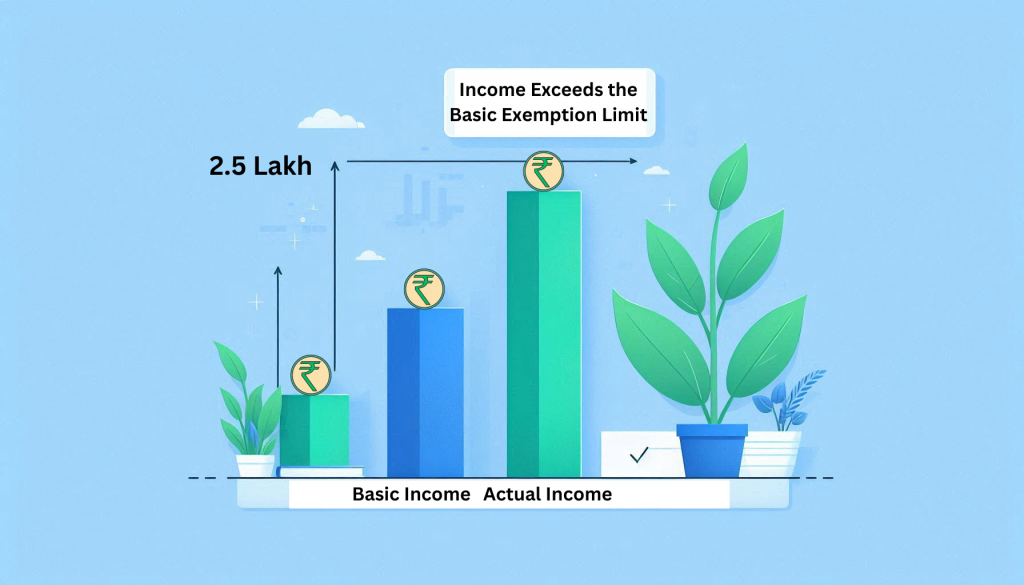Introduction
Hello friends! In today’s blog post, we’re diving into a question that’s on the minds of many NRIs this tax season: should you file an income tax return (ITR)? And if so, under what circumstances? We’re going to explore the answer in detail, considering both legal and practical aspects. This way, you can be sure whether you need to file an ITR this year and why it might be beneficial even if it’s not mandatory.
Don’t let reading hold you back, Watch our video instead.
When Filing ITR is Legally Required
Let’s start by understanding the legal requirements for filing an ITR as an NRI. There are several scenarios where it’s not just beneficial but mandatory to file your return.

Income Exceeds the Basic Exemption Limit
The first and most straightforward reason to file an ITR is if your income exceeds the basic taxable limit. For NRIs, if your total income in India is more than ₹2.5 lakh, you must file an ITR. For senior citizens (those aged 60 and above), the exemption limit is ₹3 lakh, and for very senior citizens (aged 80 and above), it’s ₹5 lakh.
It’s important to note that just paying TDS (Tax Deducted at Source) doesn’t mean you’re compliant with the income tax laws. Filing your return is mandatory if your income surpasses the basic exemption limits.
Consult CA Arun Tiwari for more information at 📞 8080088288 or cs@aktassociates.com
Expenses Exceed the Prescribed Limit
Another scenario that necessitates filing an ITR is when your expenses exceed certain prescribed limits. Many people assume income tax returns are only about income, but significant expenses can also trigger the need to file.
For example, if you’ve paid more than ₹1 lakh in a year for electricity or have spent more than ₹1 lakh on any credit card from an Indian bank, you must file an ITR. This requirement holds even if these expenses are split across multiple credit cards but collectively exceed ₹1 lakh.

Investments Exceed Certain Limits
If you’ve made substantial investments in India, you may also need to file an ITR. For instance, if you’ve invested more than ₹10 lakh in a fixed deposit (FD) or in the stock market/mutual funds in a year, it’s mandatory to file your return.
Additionally, the income tax department may issue compliance notices for high-value transactions. If you receive such a notice, you must confirm the transactions and file an ITR, even if you’ve already declared nil income.
Losses from the Sale of Property or Stocks
Filing an ITR is also necessary if you’ve incurred losses from selling property, stocks, or mutual funds. By filing a return, you can carry forward these losses to offset future income. If you don’t file, you lose the opportunity to adjust these losses in upcoming years.

Claiming a Refund
If you have TDS deducted against your PAN and are eligible for a refund, you must file an ITR to claim it. For example, if your income is ₹3.5 lakh and 10% TDS has been deducted, you’re entitled to a refund of ₹25,000. Filing an ITR is the only way to get this money back.
Practical Reasons to File ITR
Now, let’s discuss some practical reasons for filing an ITR, even when it’s not legally required.
Fluctuating Income
If your income fluctuates, with some years exceeding the basic exemption limit and others not, it’s wise to file a return every year. This habit ensures you’re always on the right side of the tax laws and can avoid any notices from the income tax department. It also provides peace of mind, knowing that all your financial affairs are in order.

Regular Income with TDS Deducted
If you have a regular income with TDS already deducted, filing an ITR makes sense even if your income is below the exemption limit. This allows you to claim the TDS as a refund. For example, if you have regular rental income and TDS is deducted, filing a return ensures you get back any excess tax paid.
Establishing Financial Credibility
Filing regular income tax returns can establish your financial credibility, which can be beneficial for various financial transactions in India. It can make it easier to get loans, apply for credit cards, or even purchase property. Your ITR serves as proof of income and financial stability.
Avoiding Future Penalties
By regularly filing your ITR, you ensure that you’re always in compliance with tax laws, which can help you avoid any future penalties or legal issues. If the income tax department finds that you should have filed a return but didn’t, you could face fines and additional scrutiny.

Latest Changes Affecting NRIs
It’s also essential to stay updated with the latest changes in tax laws affecting NRIs. Recent amendments often introduce new requirements or benefits for NRIs. Keeping informed ensures you take advantage of any new provisions and remain compliant with updated regulations.
Conclusion
In conclusion, filing an ITR is crucial for NRIs in various situations, both legally and practically. Whether it’s due to high income, significant expenses, substantial investments, incurred losses, or claiming a refund, understanding when and why to file can save you money and ensure you’re in good standing with the tax authorities.
Remember, it’s not just about meeting legal obligations but also about practical benefits like establishing financial credibility and avoiding future penalties. So, if you fall under any of the scenarios mentioned, approach a CA or someone knowledgeable to ensure your return is filed correctly and on time.
Feel free to leave a comment below if you have any questions or need further assistance. We’re here to help ensure your tax filing is smooth and stress-free. Thank you!


